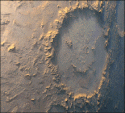This past Monday evening, while following my usual habit of glancing over the day's news headlines on my phone, before pulling the cord on my eyelids for the night, I noticed the following interesting headline:
"Kepler space telescope finds Earth-size, potentially habitable planets are common"
This is fairly exciting news and confirms what I (and hopefully you too) have logically concluded long before any reliable measurements could be made. This article (and its headline) is well constructed and explains clearly how to interpret the results intelligently.
| ScienceDaily |
But then the news app on my phone suddenly flashed as it updated the list of headlines and I was barely able to stop myself from bursting out in laughter when I saw the new headline reporting this news (from a different and obviously less-professional publication):
"Earth-like, life-friendly ALIEN WORLDS literally EVERYWHERE in galaxy"
So, how did we get from "Earth-size" to "Earth-like" and from "potentially habitable" to "life-friendly", and from "common" to "literally EVERYWHERE"? As scientists, we often joke about these kinds of laughable exaggerations that appear in mainstream media headlines aimed at the more general (non-scientific) population, as accurately depicted in this comic.
Firstly, you can probably figure out that "Earth-size" is not the same as "Earth-like" because being "like" Earth would mean matching most of the properties of Earth, not its size alone.
Secondly, measuring a drop in brightness of a star is a very long shot away from determining whether it is due to a "life-friendly" planet.
Thirdly, "literally EVERYWHERE" is such a bogus claim that I can't even justify bashing it, because "literally EVERYWHERE" means that someone has seen them "literally" everywhere (while in reality the result is only an estimate based on Kepler's observation of a tiny region of space), and "EVERYWHERE" would mean that all of empty space would be filled with those planets. Beyond bogus. Go take a course in English writing before publishing such nonsense.
Of course, this comes from a tabloid publication, whose main focus is sensationalism. But really, is it truly necessary to construct a headline full of such blatant lies and total nonsense? Many of the people who stumble onto that article will not have the scientific education required to detect the deception. Yet, I believe that many of them are smart people and do not deserve to be fooled in such a way. If news outlets can't hire reporters with solid scientific understanding to do their science reporting, they should not report on scientific matters, unless it is copied verbatim from a real scientific publication with appropriate credit.
To anyone reading this and who does not have rigorous training and experience in science, I want to urge you to pay very careful attention to every word used in science news for clues about how to interpret it. Sometimes the deception is more subtle, because facts are often presented in such a way as to be easily misinterpreted in your own brain without you realising it. Words like "potentially" and "probably" and "likely", and "apparently", and especially the love-child of science reporting, that tiny, sneaky little word "may", should all be read with emphasis and not be glanced over as if they were not even there. And don't believe everything you read in the media, and especially on the internet. And consider staying away from tabloids with their sensationalist, exaggerated headlines, unless you go there for the laugh.
I do have to mention that today (4 days later), when I opened the article again for review before writing this entry, the headline was changed to the more palatable:
"Galaxy is CRAMMED with EARTH-LIKE WORLDS – also ALIENS (probably)"
Although the deceptive "EARTH-LIKE" part remains, the article itself is fairly decent, with an insightful picture of how the Kepler measurements were made.
--
According to the current analysis of the Kepler data, it is estimated that about 22 percent of stars like our sun have planets in the habitable zone (where water can exist in liquid phase) that are between 1 and 2 times the size of Earth. That amounts to about 11 billion such planets in the Milky Way galaxy. Now that there is reliable evidence of the existence of these kinds of worlds, astronomy detectives can narrow down their observations and look for more interesting clues about the life-sustainability of those planets - and of course, justify their request for funding those investigations.
We can still look forward to much more interesting findings in the hunt for Earth-like planets, with among others, the James Webb space telescope, successor to Hubble, due for launch in 5 years (2018).










